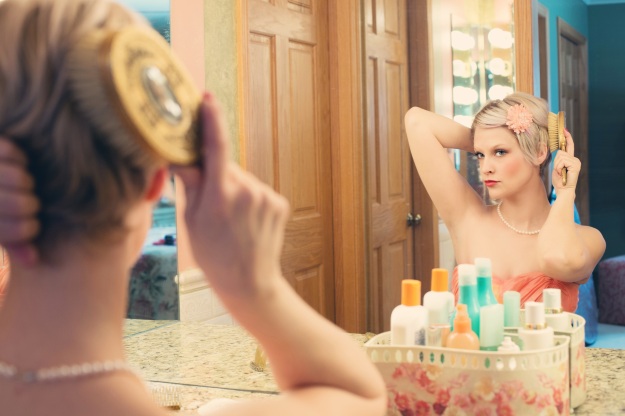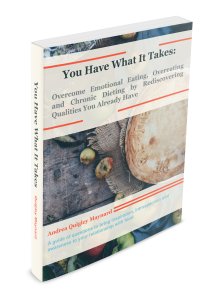
3 Things You Have to Stop doing if you want Body Acceptance (body checking in the mirror is one of them).
If you’re like most women, you want to feel good in your body more than anything else.
In fact, your desire to feel comfortable in your skin is so strong that you have spent hours upon hours (in all honesty, years!) trying to get your body to cooperate. Countless hours at the gym, endless meal planning and too many grumbles of hunger in your belly to count. The amount of effort you’ve put in to get your dream body should have been enough to get you what you wanted, but it’s not.
Even if you’ve met and hit your body “goals”, you still seem to find it all too easy to find something else that is wrong with your body. Nothing is good enough. You are not alone in this.
Ultimately we all want body acceptance. We want to wake up in the morning and not have a total meltdown over what we see in the mirror. We don’t want one decadent meal to turn into a shame spiral where we overeat and beat yourself up over it for weeks at a time. But that’s what happens when we spend hours working towards a goal and still not loving what we see in the mirror.
We feel deprived, exhausted and defeated. And then the cycle starts again.
The only way to get out of this crap is to stop working towards an impossible to reach body state. The way to body acceptance (and self acceptance) isn’t through manipulating your body to impossible standards. Body acceptance comes through working on your thoughts and feelings about your body.
There are few things you have to stop doing if you want to have a chance at getting there, and as long as we go about our day doing these things, we are actively increasing the dissatisfaction we feel about our bodies.
If you really do want body acceptance STOP doing these 3 things:
Comparing yourself to other people
Every body is different. We have different genes, body compositions, health conditions, hormone levels and personal history that contribute to what our body looks like. Even something like the position and length of our bones contributes to our bodies visual features (hence why it’s impossible for many people to ever achieve a thigh gap) or have long legs. Spending even a minute of your day comparing how your body measures up to the bodies of other women will not help you either a) get closer to looking like them or b) make you feel like your body is worthy.
If you want to accept your body, you can’t compare it to anything other than where it is today.
Checking out how you look in mirrors and windows at every chance you get.
If you’re looking at yourself in mirrors, windows and other reflections only to see what’s wrong, stop doing it. You will always see something you don’t like if you are looking for it. If you look in the mirror and like what you see, by all means, keep at it (I’m no stranger to the mirror myself!) – but if it’s making you feel shitty . . .then stop doing it. It’s certainly not going to ever help you like what you see. If you have to, cover the mirrors in your house for a period of time.
No amount of shaming or telling yourself something is ugly or needs to be fixed is going to bring you to happiness and acceptance.
If you can’t resist look in the mirror or window, challenge yourself to find something you like or love instead of doing the same old tear down. This is hard at first, but will get easier with practice (just like anything else).
Following people on social media who want to sell you a “better” body
If you follow people on social media who are selling weight loss “teas”, waist trainers, plastic wrap you slap on your abdomen or vitamin patches to make you thin . . .unfollow, unlike, click them goodbye as fast as you can. Gross. None of it works and these people know that but they’re making money off of it. They’re getting paid to promote this junk. Don’t be fooled by the way they look. It’s not the product they’re selling that got them that body – They look the way they do due to genetics, intense exercise, plastic surgery, implants, fillers and by taking dozens of photos while contouring their body into strange angles. Oh and let’s not forget the use of PHOTOSHOP and FILTERS. IT’s not real life. And even they don’t actually look the way they do in those photos in person. By following people like this you’re just going to have feelings of not being enough, not looking good enough and wanting what they have (instead of appreciating and accepting what you’ve already got!). For your sanity and happiness, stop following these folks and add people instead who don’t make you feel like something is wrong with you.
There is a huge world of great people out there who are sharing cool things, beautiful words and images of variable bodies, diverse ages, backgrounds, ethnicities etc. When you SEE more images of people who don’t fit in to the cultural standards of beauty (think white, young, thin) a really neat thing happens where you not only start to see beauty in places you hadn’t noticed it before (You had the power all along Dorothy!) but you also start to feel more comfortable and appreciative in your own skin. And when that happens, lady – you will be unstoppable!
One great way to find people to follow is to find one body positive person on social media who you respect and like (someone who shares images and articles that make you feel good!) and then check out who they follow – you’ll be bound to find some gems in there! I personally like folks like Jessamyn Stanley , Christy Harrison, Kelsey Miller, Alysse Dalessandro, Melissa Toler, and Summer Innanen for starters (I’m linking to facebook or twitter because that’s where I still spend a lot of my SM time – but you can find most of these folks and more on Instagram too.). Fill your feeds with good quality folks and watch how you feel changes!
Even if right now, accepting your body seems totally impossible, please know that you can get there! I know body acceptance is possible because it’s something you were born with. We are all born accepting our bodies the way the are. We don’t question if we measure up – we don’t have any concept of not feeling enough. That junk is taught to us. Just like you can relearn how to eat according to your hunger and fullness signals, you can also relearn how to accept your incredible body but to make that possible you’re going to have to take an active role in changing how you decide to interact with the world and with yourself.
When you’re ready to start working on this stuff in more depth, let’s talk. I’d love to be of support to you as you move away from diets and shame and instead towards listening to your true hungers and desires.




 This is the 5th and last post in my 5 week series on Body Image. See
This is the 5th and last post in my 5 week series on Body Image. See 






